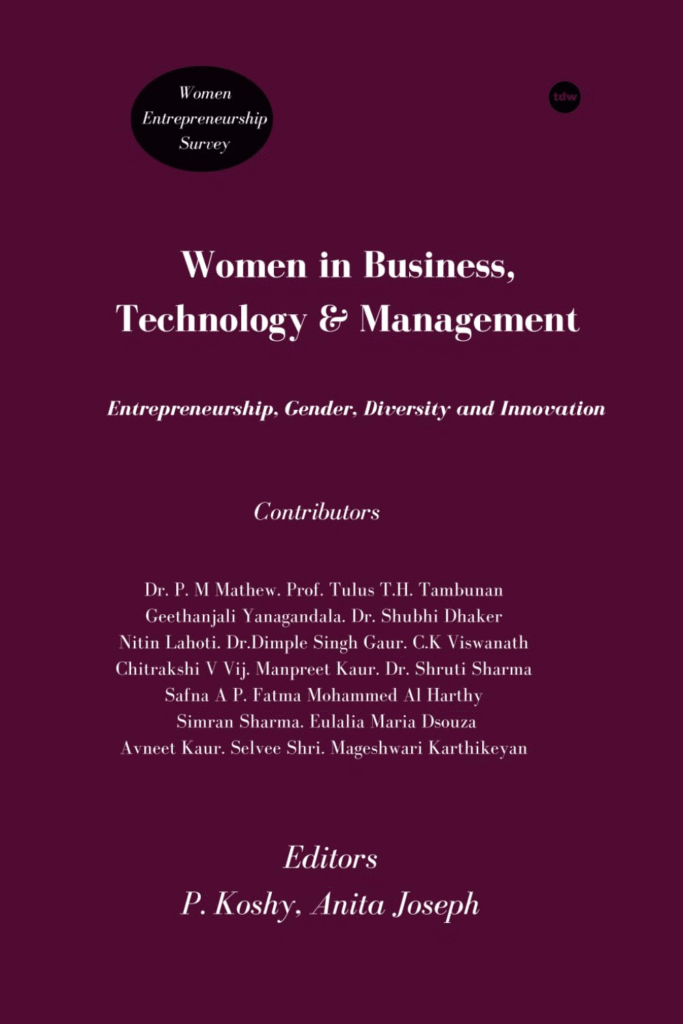Insights from the IERD-Enterprise Institute’s Survey on Women in Business, Technology & Management
Women-led enterprises are increasingly shaping the global business landscape, yet the journey toward leadership, innovation, and equality remains complex. A study conducted by the IERD-Enterprise Institute explores this evolving dynamic, offering deep insights into the opportunities, challenges, and aspirations of women entrepreneurs across diverse geographies.
Published in the book “Women in Business, Technology & Management” by TDW Productions & Publishing, the report highlights emerging patterns in women entrepreneurship and provides actionable recommendations to foster a more inclusive, equitable ecosystem.
A Global Snapshot of Women Entrepreneurs

The study surveyed women entrepreneurs between September and November 2023 using a mixed-methods approach, combining quantitative and qualitative research. Data was collected via online surveys, SME association channels, startup forums, social media groups, and interviews with entrepreneurs and executives.
Spanning regions such as Asia, North America, Europe, and the Middle East/North Africa, the survey offers a comprehensive view of women-led enterprises. Respondents represented a diverse and dynamic talent pool, with the majority aged 25 to 44 and holding postgraduate qualifications.
Two clear trends emerged in terms of specialization:
- Management, Marketing, and Business Operations
- Technology, IT, and Engineering
This reflects a powerful balance between business acumen and technical expertise, underscoring women’s growing influence in innovation-driven sectors.
Key Findings
- Micro-enterprises dominate:
43% of surveyed women-led ventures operate at the micro-enterprise level, demonstrating entrepreneurial resilience despite structural barriers. - Balancing roles remains a challenge:
77% of respondents struggle to balance work and family responsibilities, highlighting the urgent need for targeted policies that address work-life integration. - Limited access to finance:
57% cited difficulties in securing capital, indicating persistent structural challenges within financial ecosystems. - Networks and associations underutilized:
An overwhelming 77% of participants are not part of any women entrepreneur networks or industry associations, revealing a significant gap in collaboration and peer learning. - Demand for mentorship and guidance:
78% expressed interest in mentorship programs, while 67% highlighted the need for gender-specific business associations to navigate professional challenges. - Technology adoption is gaining traction:
27% of respondents are investing in digital tools and technologies, signaling growing awareness of innovation as a driver of competitive advantage.
Voices from the Field
“In my business, innovation is life. Technology drives transformative change, enhancing customer experiences in sourcing, distribution, and quality control. I envision women at the forefront of industry-transforming advancements in digital technologies and urbanization.”
— Selvee Shri, Founder, Vinsure Global Impex
“Sacrifice, consistency, discipline, and self-confidence are key attributes that lead to success. The younger generation of women brings innovative ideas and diverse aspirations, refusing to settle for less. Their determination is driving them to dream big and achieve their goals.”
— Eulalia Maria Dsouza, Entrepreneur, Mangalore
“This report captures the dynamic and diverse landscape of women’s entrepreneurship, combining data-driven insights with real-world perspectives. It highlights both the challenges and opportunities women face globally, offering actionable strategies for stakeholders.”
— Dr. P. Koshy, Director, Enterprise Institute
Towards Gender-Inclusive Growth
The report underscores the need for policy reforms, institutional support, and collaborative platforms to empower women entrepreneurs. Key recommendations include:
- Bridging financial gaps:
Develop targeted financing mechanisms and credit facilitation tailored to women-led enterprises. - Fostering mentorship and leadership networks:
Establish mentorship programs and gender-specific associations to provide support, guidance, and visibility. - Accelerating digital inclusion:
Invest in digital literacy and adoption programs to equip women with tools to thrive in technology-driven markets. - Strengthening community engagement:
Build collaborative ecosystems through women entrepreneur forums, encouraging knowledge sharing and innovation.
The findings emphasize that empowering women entrepreneurs is not only a matter of equity but a strategic driver of economic growth and innovation. By addressing systemic barriers and fostering opportunities, policymakers, businesses, and support organizations can enable women to reach their full potential.
The future of entrepreneurship depends on inclusivity—and women are poised to lead the transformation. For more: Women in Business, Technology & Management: Entrepreneurship, Gender, Diversity and Innovation